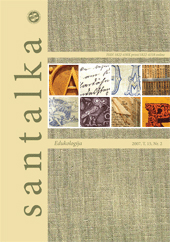Tęstinio suaugusiųjų mokymosi galimybės
Opportunities of Continuing Adult Education
Author(s): Rima Ališauskienė, Lidija UšeckienėSubject(s): Social Sciences
Published by: Vilnius Gediminas Technical University
Keywords: lifelong learning; motive learning of adult; education politics.
Summary/Abstract: After becoming the member state of the European Union, Lithuania undertook all the obligations of a member state. One of them is the implementation of The Lisbon Strategy aiming at the worlds most dynamic and competitive knowledge– based economy by 2010. Under the strategy, a stronger economy will drive job creation, sustainable development, and social inclusion. These changes demand the modernisation of education systems in the E U states, Lithuania among them. To achieve this objective, political forces came to an agreement on the future of Lithuanian education. In 2003 The Seimas of the Republic of Lithuania approved of National Education Strategy 2003–2012. This strategy is special not only because it is based on the experiences of the reform, addresses current and future world’s challenges and opportunities, maintains links with other strategic national reforms, but also emphasises efforts to ensure quality lifelong education for Lithuanian population and striving to become a partner in modern knowledge-based economy. Therefore, an extensive discussion on lifelong education strategies on individual and institution levels in all spheres of social and personal life has started in the E U and Lithuania. Nowadays lifelong learning is not just one aspect of education and training; it gradually is becoming the most important principle in the continuum of complex learning contexts. Such vision must be implemented this decade. The object of the research: the preconditions for the development of continuing adult education. The aim of the research: to examine the peculiarities of the preconditions for the development of continuing adult education in Pakruojis region. The methods of the research: analysis of references and documents on edu-cation; an anonymous survey in written form (a questionnaire); statistical analysis of data. The sample. The research was conducted in Pakruojis region in January-April, 2006. 300 respondents of different age, educational background, gender, and social status were surveyed.
Journal: Santalka: Filologija, Edukologija
- Issue Year: 15/2007
- Issue No: 2
- Page Range: 88-99
- Page Count: 12
- Language: Lithuanian

